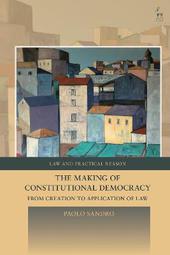
|
The Making of Constitutional Democracy: From Creation to Application of Law
Paperback / softback
Main Details
| Title |
The Making of Constitutional Democracy: From Creation to Application of Law
|
| Authors and Contributors |
By (author) Paolo Sandro
|
| Series | Law and Practical Reason |
|---|
| Physical Properties |
| Format:Paperback / softback | | Pages:416 | | Dimensions(mm): Height 234,Width 156 |
|
| ISBN/Barcode |
9781509955213
|
| Classifications | Dewey:340.11 |
|---|
| Audience | | Tertiary Education (US: College) | |
|---|
|
Publishing Details |
| Publisher |
Bloomsbury Publishing PLC
|
| Imprint |
Hart Publishing
|
| Publication Date |
27 July 2023 |
| Publication Country |
United Kingdom
|
Description
This book addresses a palpable, yet widely neglected, tension in legal discourse. In our everyday legal practices - whether taking place in a courtroom, classroom, law firm, or elsewhere - we routinely and unproblematically talk of the activities of creating and applying the law. However, when legal scholars have analysed this distinction in their theories (rather than simply assuming it), many have undermined it, if not dismissed it as untenable. The book considers the relevance of distinguishing between law-creation and law-application and how this transcends the boundaries of jurisprudential enquiry. It argues that such a distinction is also a crucial component of political theory. For if there is no possibility of applying a legal rule that was created by a different institution at a previous moment in time, then our current constitutional-democratic frameworks are effectively empty vessels that conceal a power relationship between public authorities and citizens that is very different from the one on which constitutional democracy is grounded. After problematising the most relevant objections in the literature, the book presents a comprehensive defence of the distinction between creation and application of law within the structure of constitutional democracy. It does so through an integrated jurisprudential methodology, which combines insights from different disciplines (including history, anthropology, political science, philosophy of language, and philosophy of action) while also casting new light on long-standing issues in public law, such as the role of legal discretion in the law-making process and the scope of the separation of powers doctrine.
Author Biography
Paolo Sandro is Lecturer in Law at the University of Leeds, UK.
ReviewsThe Making of Constitutional Democracy is a rich and sophisticated book. Its bibliographical apparatus is simply breathtaking. The depth of Sandro's engagement with multiple areas of legal theory is remarkable ... Sandro engages with constitutional theory, analytical jurisprudence, administrative law, and the philosophy of language with ease and rigor. -- Felipe Jimenez, USC Gould School of Law * American Journal of Jurisprudence * The book is a real learning experience. If you have accepted some of mainstream legal or political thinking, get ready to have several of your received ideas challenged on a sophisticated level ... the book is a worthwhile addition to the literature on a number of key topics in legal theory and democratic theory. -- Barbara Levenbook * JOTWELL * Packed with interesting ideas. -- Lawrence Solum * Legal Theory Blog * [This] book ... tackles, with analytical clarity and rigour, an issue that is central to today's jurisprudential debates: the distinction between law-creation and law-application ... Paolo Sandro puts forward a considerable series of arguments, many of them highly original (and, to my mind, conclusive), that ground the epistemological difference between these two activities and justify their division. His work constitutes, therefore, a major contribution to a fundamental issue: not just in philosophy of law, but in the theory of constitutional democracy as well. * Luigi Ferrajoli, Emeritus Professor of Philosophy of Law, University of Roma Tre, Italy * The book is excellently-sourced, always well-argued, and makes a case for a revival of philosophical interest in some fundamental truisms of legal and political theory: we can no longer assume to understand central concepts such as law-making, separation of powers, discretion, and application of law ... The book is also an exercise in transdisciplinary jurisprudence: here legal theory is in constant dialogue with the empirical findings in other areas of law and beyond. Sandro's work is relevant, insightful and interesting. * Patricia Mindus, Professor in Practical Philosophy, Uppsala University, Sweden * Paolo Sandro ... appears to have read everything - and I do mean everything - in legal philosophy, political theory, and the philosophy of language. His book is not, however, a compendium of the views of others. It is, rather, chock full of original and innovative arguments, brought together in a spacious book of uncommon appeal. * Stanley L Paulson, Co-Director of the Hans Kelsen Forschungsstelle, University of Kiel, Germany * How does the distinction between creation and application of law bear upon the legitimacy of our constitutional democracies? Bringing the realist's quandary about the indeterminacy of law to an examination of the conceptual and institutional features of constitutional democracy, Paolo Sandro's unfailingly erudite yet remarkably accessible book literally has something for everyone in its answer to that question. Its wide-ranging, historically sensitive, and bridge-building analysis makes a compelling case for why a distinction upon which so many assumptions and practices of democratic constitutionalism turn demands a closer look. * Kristen Rundle, Professor of Law, University of Melbourne, Australia * Paolo Sandro ties together the role of law from its creation through its application to the ideals of constitutionalism and democracy. He systematically breaks down the role of law through a systematic approach that shows the breadth of the topic, while also expanding upon many of the elements necessary for constitutional democracy. * Democracy Paradox *
|